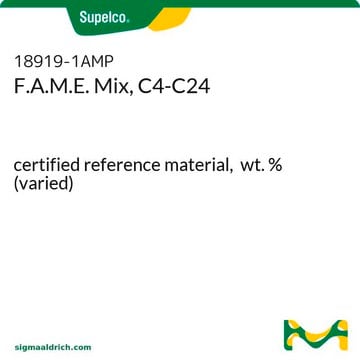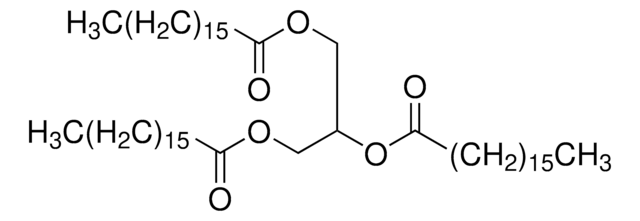T5534
Glyceryl triundecanoate
≥98%
Synonym(s):
1,2,3-Triundecanoylglycerol, Glycerol triundecanoate, Triundecanoin
About This Item
Recommended Products
biological source
synthetic
Assay
≥98%
form
solid
functional group
ester
lipid type
neutral glycerides
shipped in
ambient
storage temp.
−20°C
SMILES string
CCCCCCCCCCC(=O)OCC(COC(=O)CCCCCCCCCC)OC(=O)CCCCCCCCCC
InChI
1S/C36H68O6/c1-4-7-10-13-16-19-22-25-28-34(37)40-31-33(42-36(39)30-27-24-21-18-15-12-9-6-3)32-41-35(38)29-26-23-20-17-14-11-8-5-2/h33H,4-32H2,1-3H3
InChI key
MBXVIRZWSHICAV-UHFFFAOYSA-N
Looking for similar products? Visit Product Comparison Guide
Application
- as a reference standard in high-performance liquid chromatography (HPLC) analysis to identify the hydrolysis products and lipolytic activity in human milk
- as an internal standard in gas chromatography analysis for total fat estimation
- as an internal standard for fatty acid analysis in vegetable and meat samples
Signal Word
Warning
Hazard Statements
Precautionary Statements
Hazard Classifications
Eye Irrit. 2 - Skin Irrit. 2 - STOT SE 3
Target Organs
Respiratory system
Storage Class Code
11 - Combustible Solids
WGK
WGK 3
Personal Protective Equipment
Certificates of Analysis (COA)
Search for Certificates of Analysis (COA) by entering the products Lot/Batch Number. Lot and Batch Numbers can be found on a product’s label following the words ‘Lot’ or ‘Batch’.
Already Own This Product?
Find documentation for the products that you have recently purchased in the Document Library.
Customers Also Viewed
Our team of scientists has experience in all areas of research including Life Science, Material Science, Chemical Synthesis, Chromatography, Analytical and many others.
Contact Technical Service














